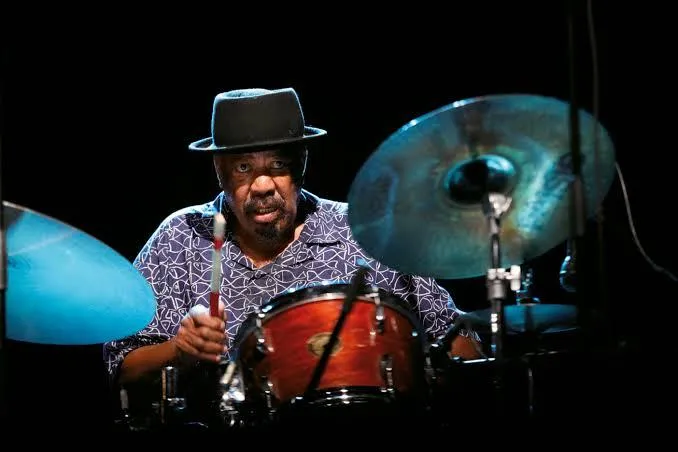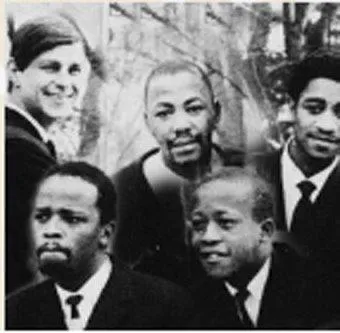Exploring the legacy of Louis Tebogo Moholo in South African jazz
A tale of a talented South African musician

South African jazz icon Louis Tebogo Moholo-Moholo died at the age of 85 and will be buried in Langa on Sunday. He was the sole surviving member of the The Blue Notes and Brothers of Breath.
Image: Tum Records

Louis Tebogo Moholo -Moholo pictured with former band members Chris McGregor, Mongezi Feza, Dudu Pukwana and John Dyani.
Image: Supplied
PALLO JORDAN
The biography of Louis Tebogo Moholo represents the narrative of the modern jazz movement in South Africa and the tale of extraordinarily talented South African musicians who left an indelible mark on the avant-garde school of modern jazz during the mid-sixties.
Born at St Monica's Hospital in Cape Town on March 10, 1940, to Christian and Dorah Moholo, Louis grew up during an exciting era for young musicians. Cape Town, as South Africa's oldest port city, had been impacted by virtually every cultural current in the evolving modern world.
The city's heterogeneous population, drawn from Africa, the Far East, Europe, mid-Asia, South America, the Caribbean, and Australasia, contributed to its rich cultural tapestry.
The cultural history of the twentieth century testifies to the universal impact of African music on modern musical tastes. As Ted Joans declared at the 1969 Algiers Pan-African Cultural Festival, jazz is African music, as are reggae, bossa nova, R&B, and rock 'n' roll.
Radio disseminated this art form, but its aesthetic values and evocative beauty contributed to its worldwide appeal.
Louis was raised in an urban African working-class community in the Western Cape. Many Africans who arrived in Cape Town during the 1800s and early 1900s first settled in District Six before being forcibly removed to Ndabeni in the 1920s.
Throughout the Cape Peninsula, African communities formed in Kensington, Blouvlei, Elsies River, Athlone, and Crawford.
In these communities, regionally-based networks formed sports clubs, but in music, regional affiliations mattered less than musical skill and talent. Langa township spawned numerous dance bands of varying quality.
Musicians like Christopher Columbus Ngcukana could transcribe migrant songs from tonic solfa to staff notation, developing a modernist ethos that broke through racial barriers imposed by white domination.
A rich cultural life existed within and between artificially divided racial communities during the 1950s. Mixed bands of African and Coloured musicians developed in District Six, Kensington, Athlone, and Elsies River. By the late 1950s, courageous white musicians like Chris McGregor joined them.
Modern jazz reached South Africa through radio, concerts, and records. The small venues where mixed-race bands performed were considered illegal under apartheid law. Simply playing in integrated bands constituted a political statement, whether intended or not, as apartheid ironically politicized actions undertaken without a political purpose.
Tebogo's musical journey began with The Chordettes, a group of young Cape Town musicians. He gained national recognition at the 1962 Jabavu Jazz Festival in Johannesburg, performing with the Jazz Ambassadors led by Cups Nkanuka. In 1963, he joined the Blue Notes, a profoundly formative experience that launched his international career.
The Blue Notes comprised Dudu Pukwana on alto-sax, Nick Moyakhe on tenor, Mongezi Feza on pocket trumpet, Chris McGregor on piano, Sammy Maritz (later replaced by Johnny Dyani) on bass, and Louis Moholo on drums. This group became the rage of the South African jazz scene before departing for the Antibes Jazz Festival in France in 1964.
The avant-garde movement drew inspiration from African heritage, asserting pan-Africanism in its expression. A jazz drummer from Africa could not have arrived in Europe at a more propitious time. The USA, previously jazz's cultural center, had seen live performance displaced by discotheques, leaving Western Europe awash with talented American musicians seeking work.
The Blue Notes brought their sensibilities to the movement, playing South African music including compositions by MacKay Devashe, Kippie Moeketsi, Abdullah Ibrahim, and traditional African pieces. Though Chris McGregor could score as skillfully as Billy Strayhorn, they didn't play American music. Their African authenticity was their strength.
Louis collaborated extensively throughout his career, working with the Brotherhood of Breath, The Spear, the Mike Osborne Trio, and numerous European musicians. His longest post-Blue Notes relationship was with Keith Tippett, a British pianist of Irish descent.
Along with other South African exiles, Louis contributed to the liberation struggle through benefit concerts and conscious musical choices. The Blue Notes established a memorial fund administered by the South African College of Music at UCT, providing bursaries for future musicians.
Louis Tebogo Moholo's talent earned numerous awards across Britain, Europe, the Americas, and post-1994 South Africa. His extensive discography reflects both personal artistry and ecumenical collaborations. Wherever he played, he represented South Africa and Cape Town with distinction.
Tsamaya sentle Moholo! Tsamaya sentle motlhankawa waÁfrika!
Louis Tebogo Moholo-Moholo's body arrives at home in Langa on Saturday, June 28, at 7am. There will be a short service at home and procession at 8:30am to St George's Cathedral for a funeral service at 9am. On Sunday, June 29 there will be a tribute concert: Blues for Louis at 3pm at Guga S'thebe in Langa.
Related Topics: